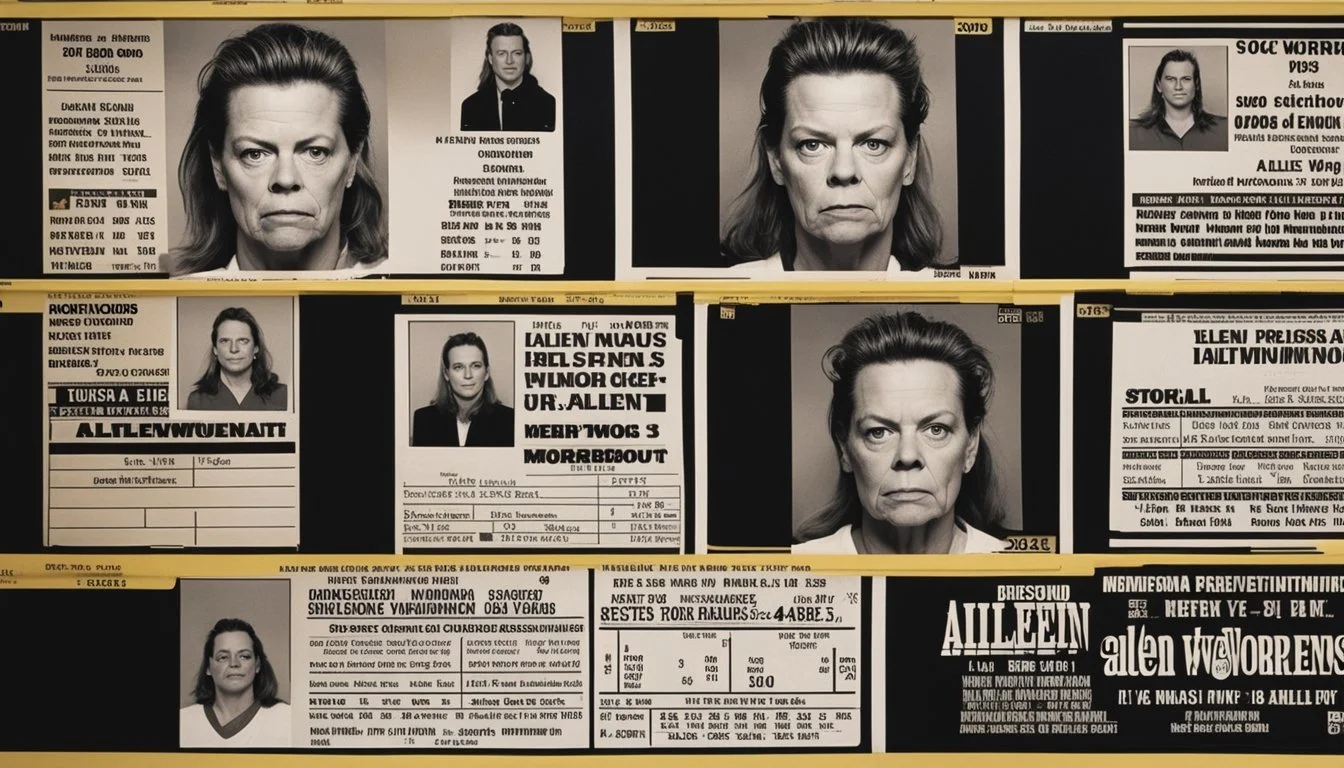Unmasking America's First Female Serial Killer: The Aileen Wuornos Story
Aileen Wuornos, a former sex worker turned serial killer, became one of the most notorious criminal figures of the late 20th century. Her case captivated the public and media, leading to numerous documentaries exploring her life, crimes, and eventual execution.
These documentaries provide viewers with in-depth analyses of Wuornos's background, motivations, and the circumstances surrounding her seven murders between 1989 and 1990. They often feature interviews with investigators, lawyers, and even Wuornos herself, offering various perspectives on her complex story. The films delve into themes of trauma, mental health, and the American justice system, sparking discussions about the nature of crime and punishment.
1) Aileen Wuornos: The Selling of a Serial Killer (1992)
Nick Broomfield directed this documentary exploring the case of Aileen Wuornos, dubbed America's first female serial killer. The film chronicles Broomfield's efforts to interview Wuornos while she was on death row.
The documentary sheds light on the media circus surrounding Wuornos' case. It reveals how various parties attempted to profit from her story, including her adoptive mother Arlene Pralle and lawyer Steve Glazer.
Broomfield's film goes beyond just recounting Wuornos' crimes. It examines the complex web of relationships and motivations of those involved in her case after her arrest.
The documentary provides viewers with a unique perspective on the sensationalism often associated with high-profile criminal cases. It raises questions about ethics in journalism and the criminal justice system.
2) Monster (2003)
"Monster" is a critically acclaimed biographical crime drama directed by Patty Jenkins. The film stars Charlize Theron in a transformative role as Aileen Wuornos, the notorious serial killer.
Theron's portrayal earned her an Academy Award for Best Actress. The movie provides a gritty and unflinching look at Wuornos' life and crimes.
The narrative follows Wuornos from her difficult childhood through her time as a sex worker in Florida. It depicts her relationship with Selby Wall (Christina Ricci) and the series of murders she committed.
Jenkins' film attempts to humanize Wuornos without excusing her actions. It explores the complex factors that may have contributed to her descent into violence.
"Monster" stands out for its nuanced approach to a challenging subject. It raises questions about societal neglect, trauma, and the nature of evil.
The film's raw realism and Theron's powerful performance make it a significant entry in true crime cinema. It offers viewers a thought-provoking examination of a troubled life that ended in infamy.
3) Overkill: The Aileen Wuornos Story
"Overkill: The Aileen Wuornos Story" is a 1992 television movie that dramatizes the crimes of serial killer Aileen Wuornos. Directed by Peter Levin, the film stars Jean Smart as Wuornos and Park Overall as her fictional friend Tyria Moore.
The movie focuses on Wuornos's killing spree in Florida between 1989 and 1990. It depicts her troubled life as a prostitute and her encounters with the men who became her victims. The narrative also explores the police investigation that ultimately led to her arrest.
Jean Smart delivers a powerful performance as Wuornos, capturing the complexity of the killer's personality. The film attempts to provide insight into Wuornos's motivations and psychological state during her crimes.
While "Overkill" takes some liberties with the facts for dramatic effect, it offers viewers a glimpse into one of America's most notorious female serial killers. The movie serves as an early example of true crime dramatization on television.
4) Aileen: Life and Death of a Serial Killer (2003)
Nick Broomfield directed this documentary as a follow-up to his 1992 film about Aileen Wuornos. The film explores Wuornos' mental state during her final days on death row.
Broomfield and co-director Joan Churchill focus on Wuornos' deteriorating psychological condition. They examine the ethical questions surrounding her execution given her apparent mental instability.
The documentary features interviews with Wuornos herself. It provides insight into her thoughts and experiences leading up to her execution in 2002.
Broomfield's signature style of inserting himself into the narrative is evident throughout the film. He interacts directly with Wuornos and other subjects on camera.
The film raises concerns about the justice system's handling of Wuornos' case. It questions whether she was of sound mind at the time of her execution.
5) Damsel of Death
"Damsel of Death" is a documentary that explores the life and crimes of Aileen Wuornos. The film delves into her troubled past and the events that led to her becoming a serial killer.
It examines Wuornos's difficult childhood, marked by abuse and neglect. The documentary also covers her time as a sex worker in Florida and the circumstances surrounding her murders.
Interviews with law enforcement officials, psychologists, and people who knew Wuornos provide insight into her mindset. The film presents a balanced view of Wuornos as both a victim and a perpetrator.
"Damsel of Death" analyzes the societal factors that may have contributed to Wuornos's actions. It discusses issues of gender, class, and the treatment of sex workers in America.
The documentary uses archival footage and reenactments to illustrate key moments in Wuornos's life. It also includes excerpts from her police interviews and court testimony.
More information about "Damsel of Death" (2022)
6) Aileen Wuornos: American Boogeywoman
"Aileen Wuornos: American Boogeywoman" (2021) is a fictionalized portrayal of the early life of notorious serial killer Aileen Wuornos. Directed by Daniel Farrands, the film stars Peyton List as the young Wuornos.
The movie focuses on Wuornos' life in 1976, well before her known killing spree. It depicts her marrying a wealthy older man and causing chaos within his family and Florida's high society.
Unlike documentaries, this film takes significant creative liberties with Wuornos' story. It blends some factual elements of her biography with fictional scenarios, creating a dramatized narrative.
The cast includes established actors like Tobin Bell and Lydia Hearst. While the film attempts to explore Wuornos' early years, it should not be considered a factual account of her life.
Critics and viewers have noted that the film's portrayal of Wuornos differs substantially from historical records. It serves more as a speculative thriller than a documentary or biopic.
7) Deadly Women: The Story of Aileen Wuornos (2009)
Deadly Women is a true crime television series that aired an episode focusing on Aileen Wuornos. The show examines female killers, and Wuornos' story was a natural fit for its format.
This episode provides a concise overview of Wuornos' life and crimes. It explores her troubled childhood, her descent into prostitution, and the series of murders she committed between 1989 and 1990.
The program uses dramatic reenactments to illustrate key events in Wuornos' life. These scenes are interspersed with expert commentary from criminologists and psychologists who analyze her motives and mental state.
Deadly Women offers a balanced perspective on Wuornos' case. It acknowledges the trauma she experienced while not excusing her actions. The episode also touches on the broader societal issues that may have contributed to her crimes.
This documentary serves as a solid introduction to the Aileen Wuornos case. It presents the facts in a clear, straightforward manner without sensationalism.
More information on Deadly Women: The Story of Aileen Wuornos
8) The Dark Side of the Female Psyche
Aileen Wuornos captivated public attention as a female serial killer, challenging societal assumptions about gender and violence. Documentaries exploring her case often delve into the psychological aspects that led to her crimes.
Nick Broomfield's "Aileen: Life and Death of a Serial Killer" (2003) examines Wuornos's mental state on death row. The film provides insight into her troubled psyche and the factors that may have contributed to her violent behavior.
"The Dark Journey of Aileen Wuornos" explores her traumatic childhood and its potential impact on her later actions. This documentary aims to uncover the psychological roots of her criminal behavior.
The podcast episode "Aileen Wuornos" from "Killer Psyche" (2021) features former FBI agent Candice DeLong analyzing Wuornos's case. It discusses how her crimes prompted investigators to reconsider their profiling methods for serial killers.
These documentaries shed light on the complex psychological factors at play in Wuornos's case, challenging viewers to consider the darker aspects of the human mind, regardless of gender.
9) Cinematic Portrayals of Aileen Wuornos
Aileen Wuornos' story has captivated filmmakers, resulting in several dramatic portrayals. These films explore her life, crimes, and the circumstances that led to her becoming a serial killer.
"Monster" (2003) stands out as the most acclaimed cinematic depiction. Charlize Theron's transformative performance as Wuornos earned her an Academy Award for Best Actress. The film offers a nuanced look at Wuornos' troubled life and relationships.
"Overkill: The Aileen Wuornos Story" (1992) was an early TV movie portrayal. Jean Smart played Wuornos in this film, which focused on her arrest and trial.
More about "Overkill: The Aileen Wuornos Story" on IMDb
"Aileen Wuornos: The Selling of a Serial Killer" (1993) and its sequel "Aileen: Life and Death of a Serial Killer" (2003) are documentaries by Nick Broomfield. These films provide a more journalistic approach to Wuornos' story.
More about Nick Broomfield's documentaries on IMDb
10) The Woman Who Changed America's View on Serial Killers
Aileen Wuornos challenged the conventional image of serial killers in American society. Her case brought attention to the complex intersection of gender, trauma, and criminal behavior.
Documentaries like "Aileen: Life and Death of a Serial Killer" (2003) explored Wuornos' troubled past and mental state. This film provided a nuanced perspective on her actions and motivations.
Nick Broomfield's work on Wuornos' story shed light on the societal and systemic issues surrounding her case. His documentaries sparked discussions about the treatment of sex workers and victims of abuse in the criminal justice system.
"Aileen Wuornos: The Selling of a Serial Killer" (1992) exposed the media frenzy and exploitation surrounding high-profile criminal cases. It raised questions about the ethics of true crime reporting and documentary filmmaking.
These films contributed to a shift in public perception, encouraging viewers to consider the broader context of criminal behavior. Wuornos' case prompted a reevaluation of the factors that contribute to violent crime and the complexities of human nature.
More information on "Aileen: Life and Death of a Serial Killer" (2003)
Background and Context
Aileen Wuornos gained notoriety as one of America's most infamous female serial killers. Her troubled early life and string of murders in Florida between 1989-1990 shocked the nation and became the subject of numerous documentaries.
Aileen Wuornos: Early Life
Born in 1956 in Michigan, Wuornos endured a traumatic childhood. Her father was a convicted child molester who committed suicide in prison. Her mother abandoned her at a young age, leaving Aileen and her brother to be raised by their grandparents.
As a teenager, Wuornos engaged in sexual activities for money and was pregnant by age 14. She gave the baby up for adoption. At 15, her grandfather kicked her out of the house.
Wuornos then lived in the woods and supported herself through prostitution. She married briefly at 20 before moving to Florida in her mid-20s, where she continued sex work.
Initial Crimes and Arrest
Between 1989 and 1990, Wuornos killed seven men in Florida. She shot them with a .22 caliber pistol and robbed them, claiming self-defense against sexual assault attempts.
Her first known victim was Richard Mallory in November 1989. Over the next year, she killed at least six more men.
In January 1991, Wuornos was arrested after her palm print was found in a crashed victim's car. Under questioning, she confessed to the murders.
The case drew national attention as one of the first high-profile female serial killer trials. Wuornos was convicted and sentenced to death in 1992.
Key Events and Timeline
Aileen Wuornos' killing spree in Florida spanned from 1989 to 1990, followed by her arrest and trial. This timeline covers the major events during her murders and subsequent legal proceedings.
1989 Murders
Wuornos began her killing spree on November 30, 1989, with the murder of Richard Mallory. His body was found in Volusia County, Florida. Over the next year, she killed at least six more men:
David Spears (June 1, 1990)
Charles Carskaddon (May 31, 1990)
Peter Siems (June 1990, body never found)
Troy Burress (July 30, 1990)
Charles Humphreys (September 11, 1990)
Walter Jeno Antonio (November 19, 1990)
Wuornos targeted middle-aged men who picked her up while she was working as a prostitute along Florida highways.
Trial and Conviction in 1990
Aileen Wuornos was arrested on January 9, 1991, at The Last Resort, a biker bar in Volusia County. She initially confessed to killing seven men in self-defense. Her trial for the murder of Richard Mallory began on January 14, 1992.
Key events during the trial:
Wuornos testified in her own defense
She claimed all the killings were in self-defense
The jury deliberated for less than two hours
On January 27, 1992, Wuornos was found guilty of first-degree murder for killing Richard Mallory. She received a death sentence on January 31, 1992. Wuornos later pleaded guilty to five other murders to avoid further trials.
Impact and Influence
Documentaries about Aileen Wuornos shaped public perception and inspired various cultural works. The films sparked debates on gender, crime, and justice while influencing media portrayals of female killers.
Media Coverage and Public Reaction
Documentaries on Aileen Wuornos garnered significant media attention. Nick Broomfield's films, including "Aileen: Life and Death of a Serial Killer," sparked discussions on mental health and the death penalty. These works challenged prevailing narratives about female criminals.
Public reaction was mixed. Some viewers sympathized with Wuornos's troubled past, while others focused on her violent crimes. The documentaries prompted debates on the ethics of capital punishment and the treatment of sex workers in the justice system.
News outlets extensively covered the case, often sensationalizing Wuornos as "America's first female serial killer." This label persisted despite its inaccuracy, highlighting the media's role in shaping public opinion.
Cultural Representations
Wuornos's story inspired numerous cultural works. The 2003 film "Monster," starring Charlize Theron, brought Wuornos's life to mainstream audiences. Theron's Oscar-winning performance further increased public interest in the case.
Books, plays, and songs also explored Wuornos's life and crimes. These works often grappled with complex themes of abuse, survival, and morality. Some portrayals humanized Wuornos, while others focused on her violent actions.
Television shows and true crime podcasts frequently referenced the Wuornos case. These adaptations contributed to her enduring presence in popular culture, cementing her status as a notorious figure in criminal history.







